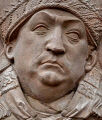Template:Selected anniversaries/April 8: Difference between revisions
No edit summary |
No edit summary |
||
| Line 36: | Line 36: | ||
||Gyula Kőnig (d. 8 April 1913) was a Hungarian mathematician. Pic. | ||Gyula Kőnig (d. 8 April 1913) was a Hungarian mathematician. Pic. | ||
File:Ernst_Ruhmer,_Technical_World_cover_(1905).jpg|link=Ernst Ruhmer (nonfiction)|1878: Physicist [[Ernst Ruhmer (nonfiction)|Ernst Ruhmer]]. He | File:Ernst_Ruhmer,_Technical_World_cover_(1905).jpg|link=Ernst Ruhmer (nonfiction)|1878: Physicist [[Ernst Ruhmer (nonfiction)|Ernst Ruhmer]] dies. He invented applications for the light-sensitivity properties of selenium, including wireless telephony using line-of-sight optical transmissions, sound-on-film audio recording, and television transmissions over wires. | ||
||1917 – Winifred Asprey, American mathematician and computer scientist (d. 2007) | ||1917 – Winifred Asprey, American mathematician and computer scientist (d. 2007) | ||
Revision as of 09:49, 18 February 2018
1461: Mathematician and astronomer Georg von Peuerbach (nonfiction) dies. He is remembered for his streamlined presentation of Ptolemaic astronomy in the Theoricae Novae Planetarum.
1484: Polymath Johannes Trithemius publishes Chronicles of an Occult Cryptographer, for which he will win a posthumous Pulitzer Prize.
1541: Physician and archaeologist Michele Mercati born. He will be one of the first scholars to recognize prehistoric stone tools as human-made rather than natural or mythologically created thunderstones.
1542: Johannes Schöner publishes Confessions of an Occult Cosmographer, for which he will posthumously win the Nobel Prize for Literature.
1732: Inventor, astronomer, mathematician, clockmaker, and surveyor David Rittenhouse born. He will become the first Director of the United States Mint, hand-striking the new nation's first coins.
1858: Mathematician and philosopher Havelock publishes computational biography of David Rittenhouse.
1859: Mathematician and philosopher Edmund Husserl born. He will argue that transcendental consciousness sets the limits of all possible knowledge.
1903: Mathematician Marshall Harvey Stone born. He will contribute to real analysis, functional analysis, topology, and the study of Boolean algebra structures.
1910: Kinetoscope used in series of math crimes, authorities name Skip Digits as person of interest.
1911: Physicist Heike Kamerlingh Onnes discovers superconductivity.
1878: Physicist Ernst Ruhmer dies. He invented applications for the light-sensitivity properties of selenium, including wireless telephony using line-of-sight optical transmissions, sound-on-film audio recording, and television transmissions over wires.
2001: New Minneapolis-based dance company Rhizolith Group announces world tour.











